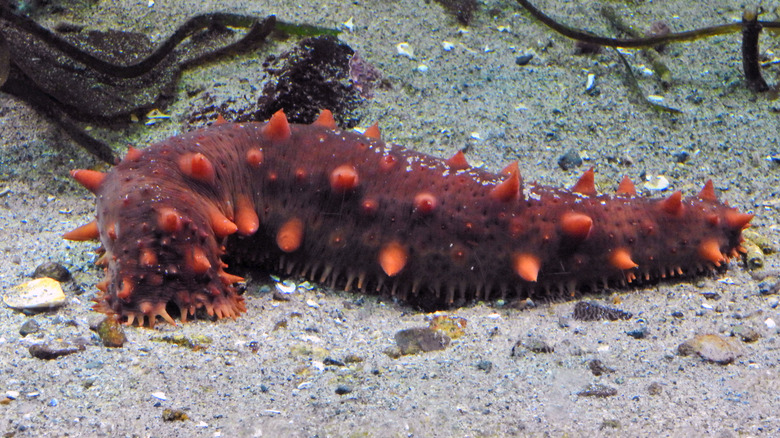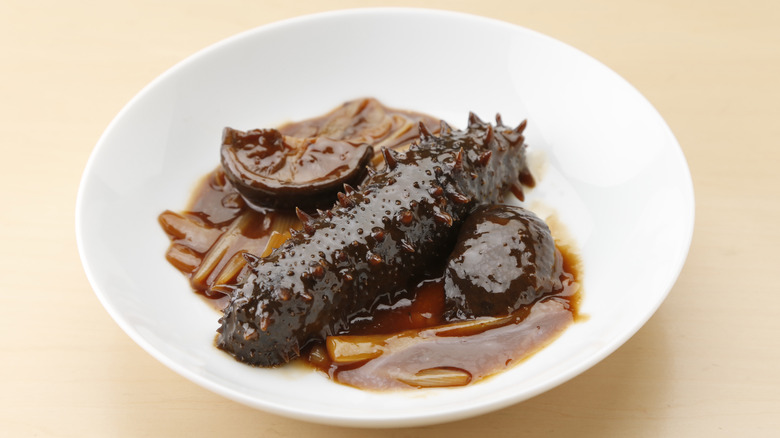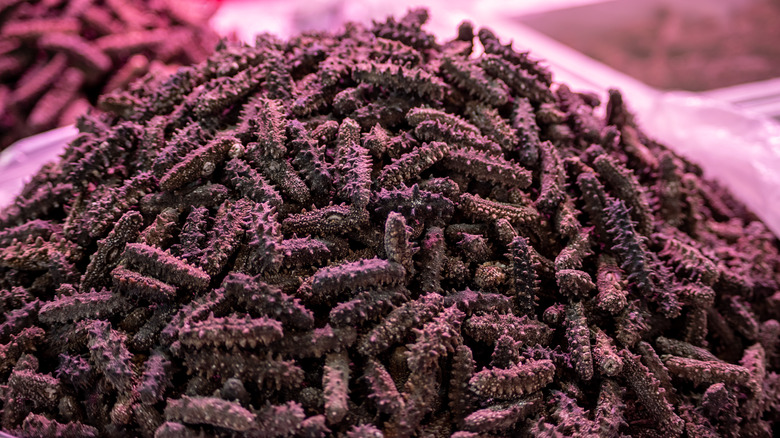Can You Eat Sea Cucumbers (And Would You Want To)?
When humankind first began hunting for sustenance, our immediate attention was focused on aquatic animals. As much as 1.95 million years ago, our ancestors were killing scores of fish, reptiles, and amphibians, but interest in water-dwelling food sources has waned since the early days of humanity. Seafood plays a minimal role in the diet of many Americans — only 20% of the country regularly consumes seafood.
It's understandable why some people would have an aversion to seafood. Honestly, aquatic animals can be very strange looking. While a uniformly brown basket of fried fish and chips might be familiar to some, sitting down at the table and being served a colossal tower of boiled crawfish, a seemingly reanimated cuttlefish served in soy sauce, or a jet-black bowl of squid ink pasta isn't necessarily what many diners in certain cultural contexts are comfortable with. Despite being beautifully prepared, sushi cannot always convince people to eat uncooked fish. Arguably one of the most alien sea critters is the sea cucumber, but much like the land-dwelling vegetable that is its nomenclatural cousin, it is perfectly edible, and in some spheres, sea cucumbers are even considered delicacies.
Scouring the sea for sea cucumbers
Sea cucumbers aren't vegetables. In actuality, they are simple invertebrates that belong to the same family as starfish. There are more than 1,000 species of sea cucumber scavenging the ocean floor, but the number of edible species is considerably smaller.
Similarly to the vegetable version of the cucumber, sea cucumbers have a very mild flavor profile. As such, you can prepare it in an essentially innumerable array of styles. It's safe to eat sea cucumber raw, and it has a mild briny taste, comparable to that of an oyster on the half shell. However, the version of the aquatic animal that you are most likely to see in supermarkets is dried, which will necessitate the extra step of hydration before consumption. Sea cucumber also serves as the perfect sauce receptacle in stir-fries and can serve as a tofu substitute in dishes that call for a neutral protein source.
Sea cucumbers as a superfood and status symbol
There are several health benefits associated with eating sea cucumber. The ocean-dweller, like many other kinds of seafood, is packed with protein for its minuscule calorie count. Sea cucumber is also a great way to get your daily dose of both niacin, a compound associated with healthy skin, and vitamin A, which plays countless roles in the body.
Sea cucumber reproduction has proven to be a difficult cycle to recreate in a farm setting. Females lay eggs, which are subsequently fertilized by the males. Once the eggs hatch, the infant cucumbers spend some time floating around the ocean before ultimately returning to the sandy bottom below. The only commercial sea cucumber farm is the Western Australia Sea Cucumber Fishery, which was awarded a sustainability certification from the Marine Stewardship Council.
Sustainability will be of the utmost importance if the sea cucumber industry is to remain above water. While farmed sea cucumbers might be an affordable and eco-friendly option, prickly sea cucumbers, which are covered in soft spikes and widely considered to have the best taste and texture of all the edible species, will still cost you a pretty penny, as it is considered a delicacy in parts of Asia. The pineapple sea cucumber has been fished to the point of endangerment, sparking legal action from governments of Indo-Pacific nations.


